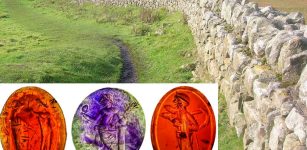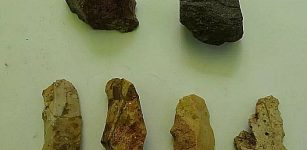Why Did Socrates Drink Poison And Commit Suicide?
Ellen Lloyd - AncientPages.com - In 399 B.C., one of the greatest philosophers of all time, Socrates was sentenced to death. Socrates was a courageous man who stood up for what he believed in. He was offered a chance to live, but he chose death instead.
In a previous article published on Ancient Pages, we discussed why Socrates was such a brilliant mind and why his enigmatic personality and thoughts still continue to influence modern philosophers.
Left: Bust of Socrates carved by Victor Wager from a model by Paul Montford, University of Western Australia. Credit: Wikipedia Right: The Death of Socrates (399 BC): He drank the contents as though it was wine. Credit: Wikipedia
As much as the modern world admires Socrates today, he was not popular among many during his lifetime. Athens was a radical democracy that prided itself on freedom of speech. All that Socrates did was talk, and yet he was sentenced to death.
Socrates was accused of "refusing to recognize the gods recognized by the state" and of "corrupting the youth." In his book, Why Socrates Died: Dispelling the Myths, author Robin Waterfield offers a comprehensive study of what led to Socrates’ trial, death sentence, and interesting account of Athenian history.
At the time of the trial, Socrates was 70 years old. The trial took place in the heart of the city. A crowd of spectators watched how three Athenian citizens, who were Socrates' accusers, spent three hours presenting their arguments against the great philosopher. Socrates was then allowed to defend himself for three hours.
At the end of the trial, the jury convicted him by a narrow majority, and he was given the death penalty.
Interestingly, Socrates was given a choice he ignored. The jury gave him the opportunity to suggest his own punishment for his crimes against the city-state of Athens.
If Socrates had suggested exile, he could have lived. However, Socrates was a stubborn, sarcastic, and proud man who was not afraid of death. Socrates joked that he could be punished with free meals at the Prytaneum, the city’s sacred hearth. Then, he suggested that he could be fined a modest sum of money. The jury discussed the choices proposed by Socrates and decided he was going to receive the death sentence.
Socrates's friends, followers, and students encouraged the great philosopher to flee Athens, but he refused. He felt that he had a legal responsibility to Athens and that escaping was not an option.
So, Socrates was taken to the nearby jail where his sentence would be carried out. Athenian law prescribed death by drinking a cup of poison hemlock. Socrates drank the hemlock, was condemned at trial, and executed his death sentence.
The great philosopher never rejected his beliefs and chose death instead of living a life of shame as an exiled old man.
Updated on February 17, 2024
Written by Ellen Lloyd – AncientPages.com
Copyright © AncientPages.com All rights reserved. This material may not be published, broadcast, rewritten or redistributed in whole or part without the express written permission of AncientPages.com
More From Ancient Pages
-
 Ancient Underground Tombs And Lightening God In Peru – Complex Concepts Of Death And Renewal Revealed
Archaeology | May 22, 2018
Ancient Underground Tombs And Lightening God In Peru – Complex Concepts Of Death And Renewal Revealed
Archaeology | May 22, 2018 -
 On This Day In History: Statue Of Venus de Milo Is Discovered On The Aegean Island Of Milos – On Apr 8, 1820
News | Apr 8, 2016
On This Day In History: Statue Of Venus de Milo Is Discovered On The Aegean Island Of Milos – On Apr 8, 1820
News | Apr 8, 2016 -
 Ancient Egyptian Knowledge Of The Cosmic Engine And Unseen God Of The Universe
Ancient Mysteries | Jan 15, 2019
Ancient Egyptian Knowledge Of The Cosmic Engine And Unseen God Of The Universe
Ancient Mysteries | Jan 15, 2019 -
 Paleolithic Humans May Have Understood The Properties Of Rocks For Making Stone Tools
Archaeology | Dec 2, 2023
Paleolithic Humans May Have Understood The Properties Of Rocks For Making Stone Tools
Archaeology | Dec 2, 2023 -
 The Main Gate Of Historical 9th-Century Old Harran Palace Unearthed
Archaeology | Oct 25, 2020
The Main Gate Of Historical 9th-Century Old Harran Palace Unearthed
Archaeology | Oct 25, 2020 -
 Mysterious Mermaid Mummy Investigated By Scientists
News | Feb 22, 2022
Mysterious Mermaid Mummy Investigated By Scientists
News | Feb 22, 2022 -
 Ice Age Cycles Played A Key Role In Early Human Interbreeding
DNA | Oct 19, 2023
Ice Age Cycles Played A Key Role In Early Human Interbreeding
DNA | Oct 19, 2023 -
 The Strange Story Of The Grave Of Copernicus
Featured Stories | Jan 5, 2024
The Strange Story Of The Grave Of Copernicus
Featured Stories | Jan 5, 2024 -
 Why Were Wampum Belts Important To Native Americans?
Featured Stories | May 10, 2018
Why Were Wampum Belts Important To Native Americans?
Featured Stories | May 10, 2018 -
 On This Day In History: Ensisheim Meteorite Fell To Earth – On Nov 7, 1492
News | Nov 7, 2016
On This Day In History: Ensisheim Meteorite Fell To Earth – On Nov 7, 1492
News | Nov 7, 2016 -
 Evidence Of The Zanclean Megaflood In The Mediterranean Sea 5 Million Years Ago
Earth Changes | Jan 22, 2025
Evidence Of The Zanclean Megaflood In The Mediterranean Sea 5 Million Years Ago
Earth Changes | Jan 22, 2025 -
 Extraordinary Bronze Age Jewelry Hoard Discovered In A Carrot Field In Switzerland
Archaeology | Oct 18, 2023
Extraordinary Bronze Age Jewelry Hoard Discovered In A Carrot Field In Switzerland
Archaeology | Oct 18, 2023 -
 Makhunik – 5,000-Year-Old City Of Dwarfs Who Hoped To Return One Day
Civilizations | May 28, 2014
Makhunik – 5,000-Year-Old City Of Dwarfs Who Hoped To Return One Day
Civilizations | May 28, 2014 -
 Mysterious Disappearance Of Rome’s Founder Romulus And Strange Vision Of Proculus That United Ancient Romans
Featured Stories | May 26, 2021
Mysterious Disappearance Of Rome’s Founder Romulus And Strange Vision Of Proculus That United Ancient Romans
Featured Stories | May 26, 2021 -
 Enigmatic Human Fossil Jawbone May Be Evidence Of An Early Homo Sapiens Presence In Europe
Evolution | May 2, 2023
Enigmatic Human Fossil Jawbone May Be Evidence Of An Early Homo Sapiens Presence In Europe
Evolution | May 2, 2023 -
 Hidden Treasures Revealed In Unique 3D Rendering Of Robber’s Cave In Nebraska
Archaeology | Dec 11, 2019
Hidden Treasures Revealed In Unique 3D Rendering Of Robber’s Cave In Nebraska
Archaeology | Dec 11, 2019 -
 Amazing 2,000-Year-Old Engraved Roman Gems Discovered Near Hadrian’s Wall
Archaeology | Jan 30, 2023
Amazing 2,000-Year-Old Engraved Roman Gems Discovered Near Hadrian’s Wall
Archaeology | Jan 30, 2023 -
 Catequil – Inca God Of Thunder And Lightning Who Predicted The Future And Was Cultural Hero Of Inca People
Featured Stories | Nov 11, 2023
Catequil – Inca God Of Thunder And Lightning Who Predicted The Future And Was Cultural Hero Of Inca People
Featured Stories | Nov 11, 2023 -
 65,000-Year-Old ‘Stone Swiss Army Knives’ Show Early Humans Had Long-Distance Social Networks
Archaeology | Oct 22, 2022
65,000-Year-Old ‘Stone Swiss Army Knives’ Show Early Humans Had Long-Distance Social Networks
Archaeology | Oct 22, 2022 -
 İnkaya Cave Study Brings To Light 86,000-Year-Old Traces Of Human Life
Archaeology | Aug 22, 2023
İnkaya Cave Study Brings To Light 86,000-Year-Old Traces Of Human Life
Archaeology | Aug 22, 2023


